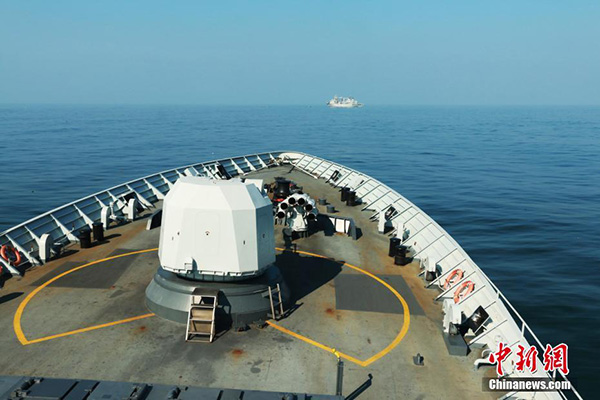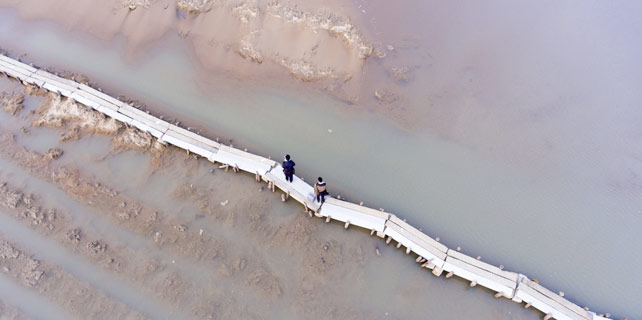Regional security could face another test
 |
|
The Chinese navy stage a 5-day drill on the South China Sea.[Photo/Chinanews.com] |
Concurrently, United States warships have began a fresh round of "navigation of freedom" in the South China Sea. Despite Chinese Foreign Ministry's strong oppositions, the US Navy dispatched the San Diego-based Carl Vinson carrier strike group into the contentious waters on Saturday, which was described as the beginning of "routine operations".
These developments in the South China Sea could add yet more uncertainty to the regional security situation. Carl Vinson's navigation in South China Sea for the first time after US President Donald Trump was sworn in, sent a message that Trump may inherit former president Barack Obama's Asia-pivot strategy.
However, Trump's trial to muddle the waters will do nothing good to the regional peace and stability. It will be totally wrong if Trump administration takes Sino-US ties as a zero-sum game in the Asia-Pacific region.
Tensions intensified in South China Sea along with the so-called arbitration case over the sea dispute between China and the Philippines in July last year, but eased gradually after Philippine President Rodrigo Duterte took a different approach from his predecessor Benigno Aquino III.
The Philippines is seeking US and Chinese assistance to guard a major sea lane against the constant attacks by Islamic militants based in southern Philippines, as they pose a threat to international shipping. To prevent the Sibutu Passage between Malaysia's Sabah state and the southern part of the Philippines from becoming the "next Somalia", the Philippines is also considering inviting Jana, which reportedly offered to send patrol ships to help it deal with surging piracy in the important sea lane.
That Duterte has invited both Chinese and US navies to clamp down on piracy by Abu Sayyaf, a notorious Islamic State-linked outfit known for kidnapping and extortion, is a welcome move to keep the important international waterway safe.
Short of patrol vessels and aircraft, the anti-piracy operation jointly launched by the Philippines, Malaysia and Indonesia faces many problems. For example, despite the operation, the number of maritime kidnappings increased to a 10-year high last year. As such, intervention by major powers such as the US and China to curb piracy could make a difference to the situation.
Collaborating with Beijing and Washington to provide public goods in the South China Sea is also in the diplomatic interest of Manila. It should be soothing news to the US, too, because despite his harsh, sometimes hostile, comments against its superpower ally, the Philippines remains open to US' military presence in the region and committed to their bilateral defense agreements.
Like other ASEAN members, the Philippines too values the multinational bloc's role in balancing the geopolitical situation and is likely to not take sides between major regional players.
Singapore's Defence Minister Ng Eng Hen said on Sunday that how the US and China engage with each other and Asian countries will be key to the stability of the Asia Pacific region.
"If US foreign policy, de facto is predominantly anti-China, I think it will be a frustrating decade for many of us in ASEAN and in Asia. Similarly for China, if its efforts are viewed as means to usurp US as the resident Pacific power. Countries will de facto have to choose sides and be put into lose-win situations," he said.
Ng's remarks reflect many ASEAN members' eagerness for friendly and healthy Sino-US ties, not the opposite.
With the Association of Southeast Asian Nation's integration evolving and its members' interactions with China deepening, it is important that all ticking time bombs like the territorial disputes in the South China Sea are addressed sooner than later.
Other factors including leadership changes in some ASEAN member states and notably, the US' intervention, could complicate the situation. The Trump administration's Asia-Pacific policy, will be vital to the stability and prosperity of Southeast Asia. And that Trump's security advisers are conservative, hawkish, and lack experience to deal with Asian affairs is not good news for the ASEAN states.
In all likelihood, Trump will not ignore his advisers' suggestions on Asia. So he could deploy more strategic and diplomatic resources in the Asia-Pacific region and also seek counseling from the Asia policy advisers of his presidential election rival Hillary Clinton.
As a result, the "rebalancing to Asia-Pacific" strategy, which Trump has shown little interest in carrying forward, could be back in the geopolitical game. And like his predecessor Obama, Trump might further strengthen US ties with ASEAN states rather than the other way round.
Asia-Pacific is a vast region that be inclusive for both China and the US, but there is a risk that tensions between Beijing and Washington will escalate if Trump continues with Obama's tactical legacy.
The author is a researcher at the National Institute of International Strategy at the Chinese Academy of Social Sciences.
- China urges US to look to history before moving on South China Sea dispute
- China lauds Mattis' call for diplomatic push on South China Sea
- Foreign Ministry reiterates South China Sea sovereignty
- China, Vietnam agree to manage differences on South China Sea
- China says deployment of defensive facilities on South China Sea islands legitimate
- Commentary: London needs to tread cautiously on South China Sea
- China to make documentary on South China Sea ecology
- US must make right choice in South China Sea






















